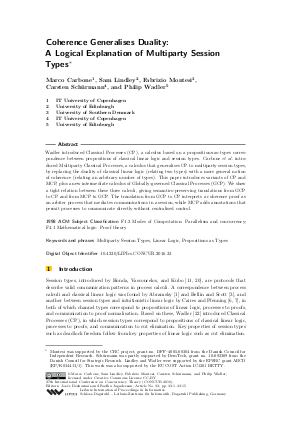Coherence Generalises Duality: A Logical Explanation of Multiparty Session Types
Authors Marco Carbone, Sam Lindley, Fabrizio Montesi, Carsten Schürmann, Philip Wadler
-
Part of:
Volume:
27th International Conference on Concurrency Theory (CONCUR 2016)
Part of: Series: Leibniz International Proceedings in Informatics (LIPIcs)
Part of: Conference: International Conference on Concurrency Theory (CONCUR) - License:
 Creative Commons Attribution 3.0 Unported license
Creative Commons Attribution 3.0 Unported license
- Publication Date: 2016-08-24
File

PDF
LIPIcs.CONCUR.2016.33.pdf
- Filesize: 0.55 MB
- 15 pages
Document Identifiers
Subject Classification
Keywords
- Multiparty Session Types
- Linear Logic
- Propositions as Types
Metrics
- Access Statistics
-
Total Accesses (updated on a weekly basis)
0PDF Downloads0Metadata Views
Abstract
Wadler introduced Classical Processes (CP), a calculus based on a propositions-as-types correspondence between propositions of classical linear logic and session types. Carbone et al. introduced Multiparty Classical Processes, a calculus that generalises CP to multiparty session types, by replacing the duality of classical linear logic (relating two types) with a more general notion of coherence (relating an arbitrary number of types). This paper introduces variants of CP and MCP, plus a new intermediate calculus of Globally-governed Classical Processes (GCP). We show a tight relation between these three calculi, giving semantics-preserving translations from GCP to CP and from MCP to GCP. The translation from GCP to CP interprets a coherence proof as an arbiter process that mediates communications in a session, while MCP adds annotations that permit processes to communicate directly without centralised control.
Cite As Get BibTex
Marco Carbone, Sam Lindley, Fabrizio Montesi, Carsten Schürmann, and Philip Wadler. Coherence Generalises Duality: A Logical Explanation of Multiparty Session Types. In 27th International Conference on Concurrency Theory (CONCUR 2016). Leibniz International Proceedings in Informatics (LIPIcs), Volume 59, pp. 33:1-33:15, Schloss Dagstuhl – Leibniz-Zentrum für Informatik (2016)
https://doi.org/10.4230/LIPIcs.CONCUR.2016.33
BibTex
@InProceedings{carbone_et_al:LIPIcs.CONCUR.2016.33,
author = {Carbone, Marco and Lindley, Sam and Montesi, Fabrizio and Sch\"{u}rmann, Carsten and Wadler, Philip},
title = {{Coherence Generalises Duality: A Logical Explanation of Multiparty Session Types}},
booktitle = {27th International Conference on Concurrency Theory (CONCUR 2016)},
pages = {33:1--33:15},
series = {Leibniz International Proceedings in Informatics (LIPIcs)},
ISBN = {978-3-95977-017-0},
ISSN = {1868-8969},
year = {2016},
volume = {59},
editor = {Desharnais, Jos\'{e}e and Jagadeesan, Radha},
publisher = {Schloss Dagstuhl -- Leibniz-Zentrum f{\"u}r Informatik},
address = {Dagstuhl, Germany},
URL = {https://drops.dagstuhl.de/entities/document/10.4230/LIPIcs.CONCUR.2016.33},
URN = {urn:nbn:de:0030-drops-61811},
doi = {10.4230/LIPIcs.CONCUR.2016.33},
annote = {Keywords: Multiparty Session Types, Linear Logic, Propositions as Types}
}
Author Details
References
-
Samson Abramsky. Proofs as processes. Theor. Comput. Sci., 135(1):5-9, 1994.

-
Andi Bejleri and Nobuko Yoshida. Synchronous multiparty session types. ENTCS, 241:3-33, 2009.

-
Gianluigi Bellin and Philip J. Scott. On the pi-calculus and linear logic. TCS, 135(1):11-65, 1994.

-
Luís Caires and Jorge Perez. Multiparty session types within a canonical binary theory, and beyond. In FORTE, 2016.

-
Luís Caires, Jorge A. Pérez, Frank Pfenning, and Bernardo Toninho. Behavioral polymorphism and parametricity in session-based communication. In ESOP, pages 330-349, 2013.

-
Luís Caires and Frank Pfenning. Session types as intuitionistic linear propositions. In CONCUR, pages 222-236, 2010.

-
Luís Caires, Frank Pfenning, and Bernardo Toninho. Linear logic propositions as session types. MSCS, 26(3):367-423, 2016.

-
Marco Carbone, Fabrizio Montesi, and Carsten Schürmann. Choreographies, logically. In CONCUR, pages 47-62, 2014.

-
Marco Carbone, Fabrizio Montesi, Carsten Schürmann, and Nobuko Yoshida. Multiparty session types as coherence proofs. In CONCUR, pages 412-426, 2015.

-
Mario Coppo, Mariangiola Dezani-Ciancaglini, Nobuko Yoshida, and Luca Padovani. Global progress for dynamically interleaved multiparty sessions. MSCS, 760:1-65, 2015.

-
Kohei Honda, Vasco Vasconcelos, and Makoto Kubo. Language primitives and type disciplines for structured communication-based programming. In ESOP, pages 22-138, 1998.

-
Kohei Honda, Nobuko Yoshida, and Marco Carbone. Multiparty asynchronous session types. JACM, 63(1):9, 2016. Also: POPL, 2008, pages 273-284.

-
Chuck Liang and Dale Miller. Focusing and polarization in linear, intuitionistic, and classical logics. TCS, 410(46):4747-4768, 2009.

-
Sam Lindley and Garrett Morris. Talking bananas: structural recursion for session types. In ICFP. ACM, 2016. To appear.

-
Fabrizio Montesi and Nobuko Yoshida. Compositional choreographies. In CONCUR, pages 425-439, 2013.

-
Jennifer Paykin and Steve Zdancewic. Linear λμ is CP (more or less). In A List of Successes That Can Change The World, pages 273-291, 2016.

-
Frank Pfenning and Dennis Griffith. Polarized substructural session types. In Foundations of Software Science and Computation Structures, pages 3-22. Springer, 2015.

-
Davide Sangiorgi. Pi-calculus, internal mobility, and agent-passing calculi. TCS, 167(1&2):235-274, 1996.

-
A. S. Troelstra and H. Schwichtenberg. Basic Proof Theory (2nd Ed.). Cambridge University Press, 2000.

-
Vasco T. Vasconcelos. Fundamentals of session types. Inf. Comput., 217:52-70, 2012.

-
Philip Wadler. Propositions as sessions. In ICFP, pages 273-286, 2012.

-
Philip Wadler. Propositions as sessions. JFP, 24(2-3):384-418, 2014. Also: ICFP, pages 273-286, 2012.

